Manchester, New Hampshire, Hgh State Clinic, Hgh Injections, Hrt Doctors
Manchester, New Hampshire Blood Testing Facilities
 Represents a LabCorp blood testing facility
Represents a LabCorp blood testing facility Represents a Quest Diagnostics blood testing facility
Represents a Quest Diagnostics blood testing facility

Nearby Labcorp Blood Testing facilities:
- Labcorp Center Distance: 2 m, 101 Riverway Pl, Bedford, Hillsborough County, NH, 3110
- Labcorp Center Distance: 16 m, 49 Range Rd Ste 101, Windham, Rockingham County, NH, 3087
- Labcorp Center Distance: 18 m, 25 Pelham Rd Ste 103A, Salem, Rockingham County, NH, 3079
- Labcorp Center Distance: 23 m, 380 Merrimack St Ste B2, Methuen, Essex County, MA, 1844
- Labcorp Center Distance: 25 m, 200 Sutton St Ste 135, North Andover, Essex County, MA, 1845
- Labcorp Center Distance: 27 m, 19 Hampton Rd Ste 13, Exeter, Rockingham County, NH, 3833
- Labcorp Center Distance: 32 m, 40 Winter St Ste 200, Rochester, Strafford County, NH, 3867
- Labcorp Center Distance: 33 m, 875 Greenland Rd Orchard Park, Portsmouth, Other, NH, 3801
- Labcorp Center Distance: 35 m, 230 Lafayette Rd Bldg D, Portsmouth, Rockingham County, NH, 3801
- Labcorp Center Distance: 43 m, 6 Lexington St 2Nd Floor, Waltham, Middlesex County, MA, 2452
- Labcorp Center Distance: 47 m, 1400 Centre St Ste 208 2Nd Fl, Newton Center, Middlesex County, MA, 2459
- Labcorp Center Distance: 50 m, 140 W Boylston Dr, Worcester, Worcester County, MA, 1606
- Labcorp Center Distance: 52 m, 21 Eastern Avenue Suite G2, Worcester, Worcester County, MA, 1605
- Labcorp Center Distance: 53 m, 123 Summer Street St 385, Worcester, Worcester County, MA, 1608
- Labcorp Center Distance: 63 m, 966 Park St Unit B7, Stoughton, Norfolk County, MA, 2072
- Labcorp Center Distance: 66 m, 72 Cudworth Rd, Webster, Worcester County, MA, 1570
- Labcorp Center Distance: 81 m, 756 Eddy St Suite 101, Providence, Providence County, RI, 2903
Nearby Quest Blood Testing facilities:
- Quest Center Distance: 0 m, 195 Mcgregor Street, Manchester, Hillsborough County, NH, 03102-3748
- Quest Center Distance: 2 m, 160 South River Road, Bedford, Hillsborough County, NH, 03110-5956
- Quest Center Distance: 15 m, 280 Pleasant St, Concord, Merrimack County, NH, 03301-2553
- Quest Center Distance: 16 m, 300 Main St, Nashua, Hillsborough County, NH, 03060-4635
- Quest Center Distance: 18 m, 45 Stiles Rd Ste 102, Salem, Rockingham County, NH, 03079-2850
- Quest Center Distance: 26 m, 700 Rogers Street, Lowell, Middlesex County, MA, 01854-3571
- Quest Center Distance: 27 m, 39 Village Square, Chelmsford, Middlesex County, MA, 01824-2743
- Quest Center Distance: 32 m, 200 Griffin Rd Unit 12, Portsmouth, Rockingham County, NH, 03801-7114
- Quest Center Distance: 34 m, 79 Erdman Way, Leominster, Worcester County, MA, 01453-0000
- Quest Center Distance: 37 m, 14 Country Club Rd, Gilford, Belknap County, NH, 03249-6907
- Quest Center Distance: 40 m, 180-182 Endicott Street, Danvers, Essex County, MA, 01923-0000
- Quest Center Distance: 42 m, 22 Mill Street, Suite 107, Arlington, Middlesex County, MA, 02476-4738
- Quest Center Distance: 48 m, 319 Longwood Ave, Boston, Suffolk County, MA, 02115-5728
- Quest Center Distance: 52 m, 100 Mlk, Jr. Blvd, Worcester, Worcester County, MA, 01608-1220
- Quest Center Distance: 56 m, 500 Congress St Ste 1E, Quincy, Norfolk County, MA, 02169-0908
- Quest Center Distance: 57 m, 340 Wood Rd, Suite 302, Braintree, Norfolk County, MA, 02184-2410
- Quest Center Distance: 58 m, 335 Morse St, 1St Floor, Norwood, Norfolk County, MA, 02062-5034
- Quest Center Distance: 60 m, 223 Chief Justice Cushing Hwy, Cohasset, Norfolk County, MA, 02025-1391
- Quest Center Distance: 61 m, 851 Main Street, S. Weymouth, Norfolk County, MA, 02190-2409
- Quest Center Distance: 65 m, 10 Commercial St, Foxboro, Norfolk County, MA, 02035-2509
- Quest Center Distance: 66 m, 210 Quincy Ave, Brockton, Plymouth County, MA, 02302-2864
- Quest Center Distance: 79 m, 1 Randall Sq, Providence, Providence County, RI, 02904-2709
- Quest Center Distance: 83 m, 57 Long Pond Rd, Plymouth, Plymouth County, MA, 02360-2670
- Quest Center Distance: 89 m, 100 Hazard Ave, Enfield, Hartford County, CT, 06082-5447
- Quest Center Distance: 93 m, 106 Main Street, Wareham, Plymouth County, MA, 02571-2122
- Quest Center Distance: 94 m, 135D Storrs Rd, Mansfield Center, Tolland County, CT, 06250-1638
- Quest Center Distance: 95 m, 520 Hartford Turnpike, Vernon, Tolland County, CT, 06066-0000
- Quest Center Distance: 96 m, 2 Concorde Way, Building 3A, Windsor Locks, Hartford County, CT, 06096-1577
- Quest Center Distance: 98 m, 42 Summer St, Pittsfield, Berkshire County, MA, 01201-4526
- Quest Center Distance: 99 m, 555 Main Street, Manchester, Hartford County, CT, 06040-5196
New Hampshire Hormone Replacement Solutions
Do you feel that your body is slowing down, and your efforts to improve your health and well-being are providing less and less return on your investment? You may be suffering from Age-Related Hormone Imbalance, and the Conscious Evolution Institute can help you restore your Hormone Balance so that you can combat premature aging and improve you vitality and quality of life!
New Hampshire Human Growth Hormone Restoration
The Conscious Evolution Institute offers quality Bio-Identical HGH Injection Therapy to men and women over the age of thirty that suffer from Age-Related Human Growth Hormone Deficiency, also known as Somatopause. Human Growth Hormone is an absolutely vital aspect of Hormone Balance which is important all throughout the lifespan, but we produce less and less of it as we age.
Symptoms of HGH Deficiency include changes in body composition, fatigue, depression, sleeping troubles, increased susceptibility to illness, trouble healing from injury, and weight gain, just to name a few. If you feel you may qualify for treatment, we encourage you to contact us today.
With our Physician Monitored HGH Restoration services, we can help restore your HGH Levels to the healthy levels associated with your early and mid twenties. We have two methods to achieve this goal. The first method is Bio-Identical HGH Therapy. In this treatment, we provide our patients with the necessary dose of Bio-Identical Growth Hormone necessary to restore youthful levels.
An alternative form of therapy involves Sermorelin Acetate Injections. These injections also have the ability to restore Growth Hormone Levels, but do so by stimulating your own body to produce the supply needed to optimize your life!
New Hampshire Low-T Treatments
Another important hormone that our clinic is highly experienced in monitoring and measuring is Testosterone. Testosterone is the hormone which embodies the male condition. It amplifies muscle mass and encourages assertiveness and dominance. It keeps men lean and trim and is the primary factor which stimulates sexual desire and ability.
If you feel that sexual excitement is fading fast from your life, or you feel that you are losing your masculine edge as you grow older, you very well may be suffering from Age-Related Testosterone Deficiency, also known as Andropause. The Conscious Evolution Institute provides a wide variety of Testosterone Replacement Treatments, including Testosterone Patches, Sprays, and Injections. If you qualify, we can ship Testosterone Injections directly to your door!
New Hampshire HCG Diet
Another one of our most popular health and wellness treatments is HCG Injection Therapy. This form of treatment is a revolutionary weight loss therapy that is intended for men and women for whom normal diets have been ineffective, but are wary of potentially dangerous surgical procedures such as stomach stapling.
HCG is a perfectly natural hormone produced under very specific circumstances by the female body, but when injected into the body of either sex, it has some tremendous implications with regard to weight loss. HCG Injections work for three reasons: They deter feelings of hunger, making dieting easier, they increase the rate of adipose fat metabolism, making stubborn bodyfat burn more readily, and they increase in natural energy sustains normal energy levels, preventing the fatigue that is normally associated with caloric restriction diets.
The HCG Diet simply works, and we can offer this treatment for you at a price you can appreciate!
Major Cities in New Hampshire
Manchester
Manchester, New Hampshire is the most highly populated city in New Hampshire, and one of the largest cities in New England. Manchester is often referred to by the nickname Queen City. Manchester is considered one of the most affordable places to live in the United States, while also providing a high quality of life.
Popular attractions in Manchester include the New Hampshire Institute of Art, the Currier Museum of Art, and the Palace Theater. The area has a quickly growing economy due to business-friendly tax laws, and the most notable business based in the city is Segway.
Nashua
Nashua is located very near to the west of Manchester, and is the second most populous city in the state of New Hampshire. Historically, the city was known for its strong textile industry, but today, the city is considered largely an outer suburb of Boston. The city has a large and popular retail presence, and the city also benefits from Tech jobs as a result of its proximity to Boston. The largest High-Tech employers in the city are Oracle, Dell, Hewlett Packard, and BAE Systems.
Concord
Concord is located to the north of Nashua and Manchester, and is the third most populous city in New Hampshire. The city is also the capital of the state. Because it is the capital, the largest employers in the city are state and local employees, including Concord School District, Concord Hospital, and the State of New Hampshire. Attractions in Concord include the McAuliffe-Shephard Discovery Center, Steeplegate Mall, and the Capital Center for the Arts.
Derry
Derry, New Hampshire is the fourth most populous incorporated area in the state, and is located to the west of Nashua. Derry is not a city, like the larger populations of the state, but is a township. Derry is popularly referred to as Space Town, because it is where Alan Shephard was born, the first American in outer space. Derry is a relatively small town, and the largest private employers in the city are the Pinkerton Academy and the Parkland Medical Center.
Dover
Dover is the fourth largest city in the state, and the fifth largest incorporated area. Popular destinations in the city include the Children's Museum of New Hampshire and the Wentworth-Douglass Hospital. The city is also home to the beautiful Whitcher's Falls.
All About Manchester, New Hampshire Geographic Area
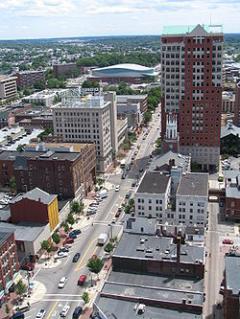
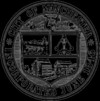
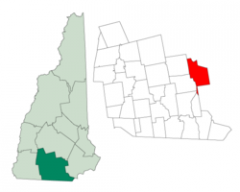
Manchester is the largest city in the U.S. state of New Hampshire, the tenth largest city in New England, and the largest city in northern New England, an area comprising the states of Maine, New Hampshire, and Vermont. It is in Hillsborough County along the banks of the Merrimack River, which divides the city into eastern and western sections. Manchester is near the northern end of the Northeast megalopolis. As of the 2010 U.S. Census, the city had a population of 109,565, the most of any city in northern New England.
In 2009 CNNMoney.com rated Manchester 13th in a list of the 100 best cities to live and launch a business in the United States. In addition, Kiplinger voted Manchester the second most tax friendly city in the United States, second only to Anchorage, Alaska. Also in 2009, Forbes magazine ranked the Manchester region first on its list of "America's 100 Cheapest Places to Live."
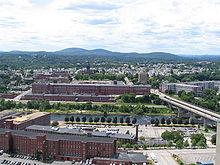
Pennacook Indians called it Namoskeag, meaning "good fishing place" aea reference to the Amoskeag Falls in the Merrimack River. In 1722, John Goffe settled beside Cohas Brook, later building a dam and sawmill at what was dubbed Old Harry's Town. It was granted by Massachusetts in 1727 as Tyngstown to veterans of Queen Anne's War who served in 1703 under Captain William Tyng. But at New Hampshire's 1741 separation from Massachusetts, the grant was ruled invalid and substituted with Wilton, Maine, so Governor Benning Wentworth rechartered the town in 1751 as Derryfield. Derryfield remains a neighborhood in contemporary Manchester, along its easternmost area adjacent to Massabesic Lake.
In 1807, Samuel Blodget opened a canal and lock system to allow vessels passage around the falls. He envisioned here a great industrial center, "the Manchester of America", like the Industrial Revolution's Manchester in England, the first industrialized city in the world. Sure enough, in 1809, Benjamin Prichard and others built a cotton spinning mill operated by water power on the western bank of the Merrimack. Following Blodgett's suggestion, Derryfield was renamed Manchester in 1810, the year the mill was incorporated as the Amoskeag Cotton & Woolen Manufacturing Company. It would be purchased in 1825 by entrepreneurs from Massachusetts, expanded to 3 mills in 1826, and then incorporated in 1831 as the Amoskeag Manufacturing Company.
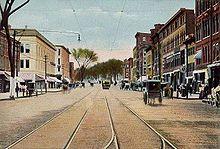
On the eastern bank, Amoskeag engineers and architects planned a model company town, founded in 1838 with Elm Street as its main thoroughfare. Incorporated as a city in 1846, Manchester would become home to the largest cotton mill in the world aeMill No. 11, stretching 900 feet (270 m) long by 103 feet (31 m) wide, and containing 4,000 looms. Other products made in the community included shoes, cigars, and paper. The Amoskeag foundry made rifles, sewing machines, textile machinery, fire engines, and locomotives in a division called the Amoskeag Locomotive Works (later, the Manchester Locomotive Works). The rapid growth of the mills demanded a large influx of workers, resulting in a flood of immigrants, particularly French Canadians. Many current residents descend from these workers. The Amoskeag Manufacturing Company went out of business in 1935, although its red brick mills have been renovated for other uses. Indeed, the mill town's 19th century affluence left behind some of the finest Victorian commercial, municipal, and residential architecture in the state.
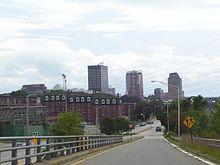
Manchester is nicknamed the Queen City, as well as the more recently coined "Manch Vegas". In 1998, Manchester was named the "Number One Small City in the East" by Money magazine. The Mall of New Hampshire, on Manchester's southern fringe near the intersection of Interstates 93 and 293, is the city's main retail center. In 2001, the Verizon Wireless Arena, a venue seating more than 10,000, opened for major concerts and sporting events, enhancing the city's downtown revitalization efforts with a major hotel and convention center already in place directly across the street from the arena.
Manchester is located at 42 °59 a²11 a³N 71 °27 a²6 a³W / 42.98639 °N 71.45167 °W / 42.98639; -71.45167 (42.986284, -71.451560).
According to the United States Census Bureau, the city has a total area of 34.9 square miles (90 km2), of which 33.0 square miles (85 km2) is land and 1.9 square miles (4.9 km2) is water, comprising 5.44% of the city. Manchester is drained by the Merrimack River, the Piscataquog River and Cohas Brook. Massabesic Lake is on the eastern border. The highest point in Manchester is atop Wellington Hill, where the elevation reaches 570 feet (170 m) above sea level.
Manchester has a four-season humid continental climate (Koppen Dfb), with long, cold, snowy winters, and very warm and somewhat humid summers; spring and autumn in between are crisp and brief transitions. The following data are presented from Massabesic Lake, which is located at the eastern edge of the city. Precipitation is well-spread throughout the year, though summer is the wettest. Snowfall, delivered often through nor'easters, averages around 47 inches (119 cm) per season, but varies widely each year.

Bridge Street in 1909

War Monument c. 1905

Granite Street c. 1900

Old Fire Station in 1907
Manchester is incorporated as a city under the laws of the State of New Hampshire, and operates under a strong mayoral form of government. The mayor serves as chairman of the fourteen-member Board of Mayor and Aldermen, the city's legislative body. Each of Manchester's twelve wards elects a single alderman, and two additional at-large members are elected citywide.
The mayor also serves as the chair of the board of school committee. Like the board of aldermen, the school board has twelve members elected by ward and two at-large members. The School Board is not a city department; rather, it is a school district coterminous with the city, which obtains financing from the Board of Mayor and Aldermen.
The Manchester Planning Board, in its 2010 Master Plan, defines 25 neighborhoods within the city. LivableMHT has drawn maps of the neighborhoods and neighborhood village centers as defined by the city. Recognition of particular neighborhoods varies, with some having neighborhood associations, but none of have any legal or political authority.
The major neighborhoods, historically, include Amoskeag, Rimmon Heights, Notre Dame/McGregorville and Piscataquog/Granite Square on the West Side; and the North End, Janeville/Corey Square, Hallsville and Bakersville on the East Side; along with Youngsville and Goffes Falls on the periphery of the city.
In 2007, the city began a Neighborhood Initiatives program to "insure that our neighborhoods are vibrant, livable areas since these are the portions of the city where most of the residents spend their time living, playing, shopping and going to school." The purpose of this initiative is to foster vibrancy and redevelopment in the neighborhoods, and to restore the sense of neighborhood communities that had been overlooked in the city for some time. The city began the program with street-scape and infrastructure improvements in the Rimmon Heights neighborhood of the West Side, which has spurred growth and investment in and by the community. Despite the success of the program in Rimmon Heights, it was unclear in recent years how the City planned to implement similar programs throughout the city. The City announced plans for extending the Neighborhood Initiatives program to the Hollow neighborhood in February 2012.
The urban core of Manchester extends beyond its city limits in several directions, particularly west and south of downtown, including:
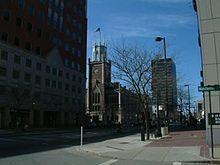
Manchester's population at the 2010 census was 109,565. The city is the center of the Manchester, NH, New England City and Town Metropolitan Area (NECTA MA), which had a population of 187,596 as of the 2010 census.
As of the census of 2010, there were 109,565 people, 45,766 households, and 26,066 families residing in the city. The population density was 3,320.2 people per square mile (1,281.5/km ²). There were 49,288 housing units at an average density of 1,493.6 per square mile (576.5/km ²). The racial makeup of the city was 86.1% White, 4.1% Black or African American, 0.30% Native American, 3.7% Asian, 0.1% Pacific Islander, 3.1% from some other race, and 2.7% from two or more races. Hispanic or Latino of any race were 8.1% of the population.
The largest ancestry groups within the city's population are: French (22.1%), Irish (20.2%), English (10.3%), Italian (7.9%) and German (7.4%).
At the 2010 census there were 45,766 households, out of which 26.4% had children under the age of 18 living with them, 38.4% were married couples living together, 13.1% had a female householder with no husband present, and 43.0% were non-families. 32.4% of all households were made up of individuals and 9.8% had someone living alone who was 65 years of age or older. The average household size was 2.34 persons and the average family size was 2.99.

In the city the population was spread out with 21.6% under the age of 18, 10.2% from 18 to 24, 30.4% from 25 to 44, 26.0% from 45 to 64, and 11.8% who were 65 years of age or older. The median age was 36.0 years. For every 100 females there were 98.5 males. For every 100 females age 18 and over, there were 96.6 males.
At the 2000 census the median income for a household in the city was $40,774, and the median income for a family was $50,039. Males had a median income of $34,287 versus $26,584 for females. The per capita income for the city was $21,244. 10.6% of the population and 7.7% of families were below the poverty line. Out of the total people living in poverty, 14.6% are under the age of 18 and 11.7% are 65 or older.
The city is served by four newspapers: the New Hampshire Union Leader (formerly the Manchester Union Leader) (a daily); the Manchester Express (a weekly newspaper published by Hippo Press); The Hippo (weekly); and the Manchester Mirror (a weekly produced by the New Hampshire Union Leader).
In addition to several commercial AM and FM radio stations, Manchester is also served by local cable television and hosts one commercial television station:
Manchester is on the northern edge of the Boston television market.
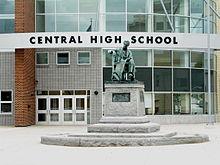
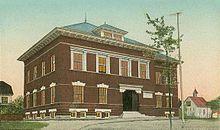
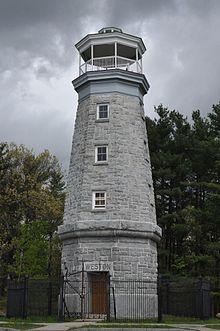
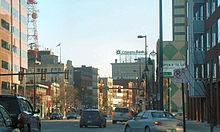
Manchester's public school system is run by the Manchester School District.
Manchester School District has four public high schools:
Manchester School District has four public middle schools and fourteen elementary schools.
Manchester is served by four private high schools:
In addition:
Area institutions of higher education, together enrolling more than 8,000 students, include:
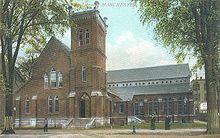
Cultural landmarks include the historic Palace Theatre; the Currier Museum of Art; the New Hampshire Institute of Art; the Franco-American Center; the Manchester Historic Association Millyard Museum; the Massabesic Audubon Center; the Amoskeag Fishways Learning and Visitors Center; the Lawrence L. Lee Scouting Museum and Max I. Silber Library; and the SEE Science Center. Valley Cemetery, since 1841 the resting place of numerous prominent citizens, is an early example of a garden-style burial ground.
The Verizon Wireless Arena is a civic center that hosts a variety of events, from professional minor-league sports such as hockey and arena football to concerts with major recording artists and comedians, national touring theatrical productions, family-oriented shows, and fairs. It opened in November 2001 and seats more than 10,000 patrons. The John F. Kennedy Memorial Coliseum is another, smaller venue located in downtown Manchester with a capacity of approximately 3,000 seats. It was completed in 1963, serves as home ice for the Manchester Central and Memorial High School hockey teams, and is home to the Southern New Hampshire Skating Club.
The nickname "ManchVegas" was derived from illegal gambling in local businesses during the late 1980s or early '90s. Many pizza shops and local bars had video poker machines that would pay out real money. The nickname was coined following a city-wide bust of these machines. It was then adopted as a lampoon of the city's limited entertainment opportunities. The term has since become a source of pride as the city's entertainment scene has grown. By 2003 it was well enough known that a note on Virtualtourist.com said, "Residents reflect the regional dry humor by referring to sedate Manchester as 'ManchVegas'." By 2005, an article in Manchester's Hippo Press (a local alternative weekly) said that then-Mayor Robert A. Baines "is pushing to replace the nickname ManchVegas with Manchhattan" (meaning Manchester+Manhattan). In 2009 the film Monsters, Marriage and Murder in Manchvegas was released referencing Manchester's popular nickname and using much of the city as its backdrop.
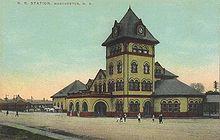
The city is served by Manchester-Boston Regional Airport, the fourth largest airport in New England. It is the secondary airport serving Boston, Massachusetts, and is used by most of the nation's major airlines, with the largest market share held by Southwest Airlines. Alternative airports include Boston's Logan International Airport and Portland International Jetport in Maine.
Interstates 93 and 293 and the F.E. Everett Turnpike are multi-lane highways that connect the metropolitan area to Concord and the White Mountains to the north and Nashua and Boston to the south. NH 101 is a four-lane highway eastbound from Manchester to Hampton Beach, connecting the city with the southeastern part of the state and the seacoast, as well as Maine and the Massachusetts North Shore via Interstate 95. West of Manchester, NH 101 is a two-lane highway serving as the main artery to Keene, the Monadnock region, and other points in southwestern New Hampshire, eventually connecting to NH 9 and the state's border with Vermont. US Route 3 and state routes 28 and 3A also flow through the city.
A direct highway access with the airport connects the Everett Turnpike just south of the city with the Manchester-Boston Regional Airport via a Merrimack River-crossing connector road.
Public transportation is provided by the Manchester Transit Authority, which runs several bus routes throughout the city and surrounding areas. Concord Trailways and Boston Express run commuter services to Boston and other parts of the state. Vermont Transit Lines (affiliated with Greyhound Lines) has lines to Montreal. In 2008, Boston Express moved to suburb Londonderry, New Hampshire, and now provides only limited service to downtown Manchester.
The possibility of Manchester being served by the Capital Corridor, an extension of the MBTA commuter rail from its current terminus in Lowell, Massachusetts to Concord, which would also include a stop at Manchester-Boston Regional Airport, is being studied by the New Hampshire Rail Transit Authority and New Hampshire Department of Transportation, which have received federal funding for studying and planning the route. The Capital Corridor route is also being studied as a possible future high-speed rail line connecting Montreal and Boston. Currently, Manchester is one of the largest cities and metropolitan areas in the United States without Amtrak service. With the expansion of Interstate 93 to eight lanes from Salem to Manchester under construction, space is being reserved in the median for potential future commuter or light rail service along this corridor.
In late 2011 Dean Kamen, famous for inventing the Segway and owner of several buildings in the Millyard, proposed a rail loop for downtown and the Millyard. Several meetings have been held with area business and property owners, city officials and local developers, but the idea is in the early conceptual stages.
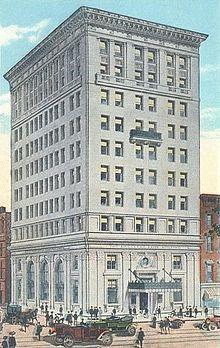
Manchester is northern New England's largest city, and its metropolitan area is one of the fastest growing in New England. Its economy has changed greatly, as Manchester was a textile mill town about 20 years ago. In March 2009 Kiplinger voted Manchester the second most tax friendly city in America, after Anchorage, Alaska. Earlier in the year, CNN rated Manchester 13th in its 100 best places to live and launch a business in America.
Manchester is the home of Segway, Inc., manufacturers of a two-wheeled, self-balancing electric vehicle invented by Dean Kamen.
Downtown Manchester's One City Hall Plaza and the all-black Hampshire Plaza stand 20 stories high and are the tallest New England buildings north of Cambridge, Massachusetts ae therefore, the tallest buildings in northern New England. The Hampshire Plaza is shorter than City Hall Plaza by a mere 16 feet (4.9 m). Other major buildings include the 13-story New Hampshire Tower; the New Hampshire headquarters of Citizens Bank, in the renovated and heightened former Amoskeag Bank building (at the original 10 stories, once Manchester's treasured nickname as Manchester's "skyscraper" for many decades in the early 20th century); the former Carpenter Hotel, at 12 stories, usurped the Amoskeag Bank's relished claim of Manchester's "skyscraper" a few decades later in that century; and Bank of America.
The Verizon Wireless Arena has become the centerpiece of downtown Manchester. The venue can seat slightly less than 12,000 patrons for concerts, and at least 10,000-seat configurations for sporting and other forms of entertainment. The Verizon is also home to the Manchester Monarchs, the local AHL affiliate of the Los Angeles Kings. The Northeast Delta Dental Stadium (formerly Merchantsauto.com Stadium) is a baseball park located on the Merrimack River in downtown Manchester and is home to the local AA baseball affiliate of the Toronto Blue Jays, the New Hampshire Fisher Cats. Historic Gill Stadium supported professional minor-league baseball into the early 21st century and continues to be a viable and popular downtown venue for many sporting and entertainment events, seating nearly 4,000 patrons, depending on the event format.
The Red Arrow, rated in 1998 as one of the top 10 diners in the United States, is located downtown.
In recent years there has been continual redevelopment of the Amoskeag Millyard and its residential Historic District. The increasing popularity of downtown living has caused many properties originally built as tenement housing for mill workers in the 19th century to be converted to stylish, eclectic residential condominiums. Many new retail stores and higher education institutions have been uniquely retro-fitted into properties along Commercial and Canal Street.
Manchester has two main retail areas: downtown Manchester and South Willow Street (NH Route 28). The Mall of New Hampshire is located on South Willow Street, and, with more than 125 stores, is one of the largest shopping centers in southern New Hampshire and central New England.
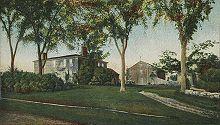
Word Count: 3806






